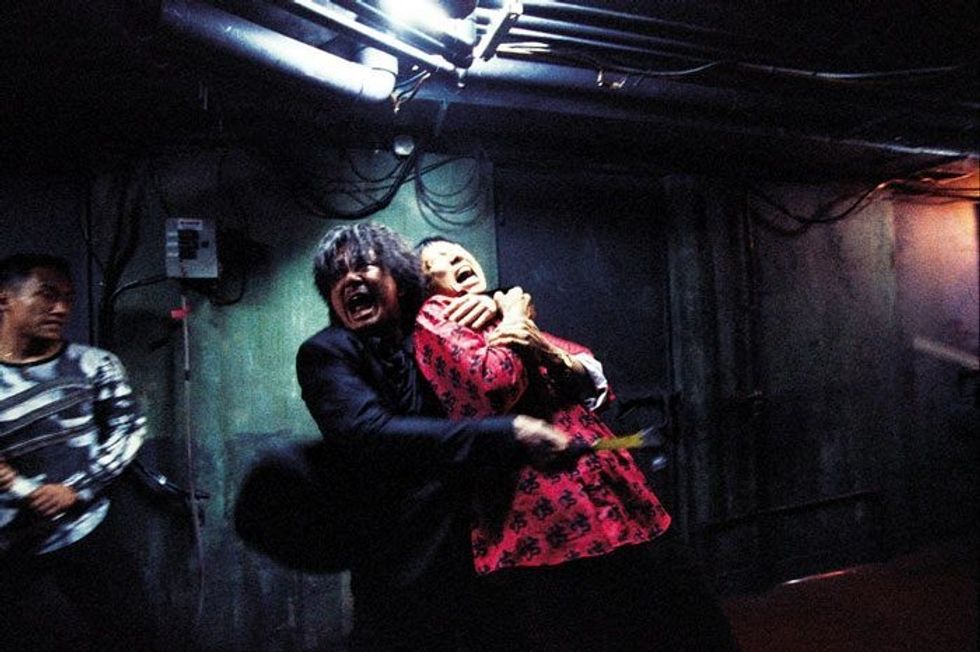Yes, that Oldboy. Not Spike Lee's box office and critical mess of a remake, but the 2003 Korean extreme masterpiece that signaled the height of hallyu and the "Asian craze" of the early 2000s. It's often one of the only Korean films that Western moviegoers may know, and it's certainly one of the most well regarded. If you've already seen it, kudos to you and congratulations. Read no further. I just ask that you pass on this link to a friend or, better yet, sit them down yourself and introduce them to this classic, a true blockbuster from Korea's own Tarantino. If you haven't seen it, or worse, haven't even heard of the film, sit back and let me dazzle you with some commercial charm.
On the surface, Oldboy is a nostalgic pleasure, though not in the soft and fluttery vein of Home Alone or Toy Story. Rather, Oldboy is a keystone film from the "Asian extreme" movement that began in the mid to late '90s and ended in the early 2000s, a wave of movies from Japan, Hong Kong, and South Korea mostly coming in the form of ultra-violent horror thrillers such as Ringu or The Audition. It's a fondly remembered footnote of the edgy scene phase and Stefani-esque "kawaii" years of the 2000s, a little dash of pop culture from overseas that added a splash of color and blood to the teen and preteen cringe that we've all come to laugh at. Oldboy, however, goes beyond simple slasher pleasure and offers something that seems to have been forgotten in the tacky faux-Asian aesthetic of a millennial childhood:
Oldboy is not just some button of Asian culture pinned onto the tacky new millennium. Oldboy is the new millennium. It is a cultural landmark in world history and jammed together into its panic attack of a mystery thriller is the expression of two phenomena that have defined how we are coming to understand the modern world—globalization and aesthetics. The second installment of Park Chan-Wook's revenge trilogy, Oldboy is the film that ultimately defined postmodernism for South Korean cinema, not only in "the look" but in how it integrates ideas of "cool" and style from across the globe. It sounds silly, I know, but Tarantino did the same thing with Kill Bill and nobody's laughing, now are they?
The film follows the revenge-fueled part-rampage part-investigation of Oh Dae-Su, a man inexplicably imprisoned for fifteen years in a locked room with only a tv for company and education. It is from that intensive chamber of pop culture isolation that our hero emerges, sporting a manga-worthy haircut as he flexes his self-trained martial arts skills and his knack for reaping mayhem with unconventional weapons on common street thugs and the henchmen of the mysterious mastermind behind his imprisonment.
Perhaps the best example of the balance of aesthetics, insanity, and rabid beauty that Park Chan-Wook creates with this pastiche masterwork is when Oh Dae-Su, shortly after being released from his confinement, runs into a pack of low-level wannabe thugs and, donning a pair of ridiculously flamboyant sunglasses and somehow completely pulling them off, is knocked on his ass before hopping up and destroying the helpless teens with a cut of fight sequences he learned from the endless hours of tv that he reprogrammed his brain watching.
Summarily, apart from the insane plot line which I am obliged not to discuss for reasons of not spoiling its stunning twists, the film's intent is to capture a hero who, after years of concentrated isolation and media inundation, is a basin for aesthetics, a gutted man whose hollow emotional center has been replaced with our modern preoccupation with style. And by God, does this film have style.
Imagine time stopping as a hammer is held aloft over someone's head, only for a dotted line to appear during the frozen panic, showing the exact trajectory of where that hammer is going to crack his skull. Resume time. Cut. That's Oldboy.
Imagine panning through a vast, lush field of grass. Then suddenly, a suitcase. What's that doing there? Suddenly, it bursts open and a man is toppling out of it and onto the grass. And suddenly, oops, did I say a lush field? It turns out it's actually just a patch of greenery on a rooftop in the middle of the city. The viewer is just about as disoriented as Oh Dae-Su and perhaps even more confused. That's Oldboy.
Imagine a man, bloody with his hair shorn wildly, sitting down calmly in a sushi bar, ordering a live octopus to eat, eating said octopus while it's squirming and writhing, and passing out face first into the table with the tentacles curling around his still-open mouth. That's grossly violent and almost absurd, yet utterly captivating. That's insane. That's Oldboy.
It's a film that relishes in an era where aesthetics and personality are free to run wild, a joyride that disorients, dislocates, disgusts, and summarily disregards viewers' expectations of what they think they know of postmodern cinema. Nothing short of a gem, this film is so awash with character that it commands a unique generic presence of its own, expressing the culmination of historical anxiety about entering the new era, Y2K, and representing that anxiety with all the absurdity, personality, violence, and unexpected poignancy that it demands.






















